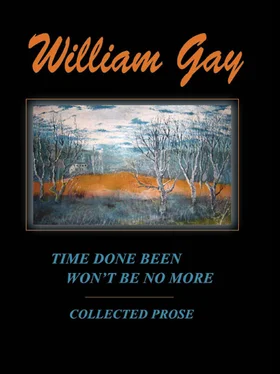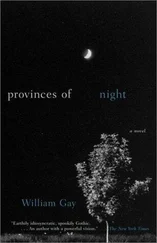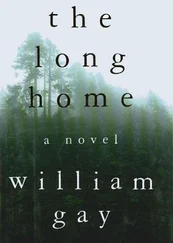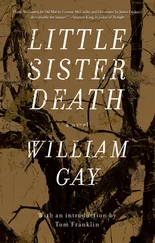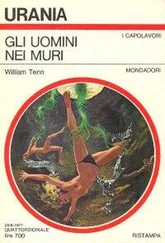I’m sorry, Wesley, Sandy called. I left that bag setting on the kitchen table.
Wesley straightened. Well it’ll do a whole hell of a lot of good setting on a table fifty miles from where I am, he said. He sailed the lid out over the river like an enormous rectangular Frisbee.
I said I was sorry. I really am.
Regret is not jet fuel, Wesley said. He hurled the cooler into the water. Everything went: cellophaned sandwiches, a sixpack of Coke, apples bobbing in the rapid current. A bottle of vin rose.
Shit, Dennis said.
Wesley came wading out of the river, Sandy and Christy were buckling on life jackets. Dennis glared sharply at Wesley’s face. He stood up and put his folded glasses into the pocket of the denim shirt.
I don’t think you’re supposed to be throwing crap in the river like that, Christy said.
Oh no, Wesley said. The river police will get me.
Dennis was staring out at the lighthammered water. Lester and his cohorts had drifted out of sight around the bend. Now where is this famous Civil War cave? He asked.
Supposed to be somewheres close, Wesley told him, relaxing visibly. He turned to the women. Can you all handle a canoe?
I can row as good as you can, Christy told him. Maybe better.
You all check out one side of the river and me and this fine defender of southern womanhood’ll look on the other. Check out every bluff, look for anything that might be a cave. It’s supposed to be about halfway up. If you find a cave, sing out as loud as you can and we’ll be there.
OK?
OK.
And keep those life jackets on. If you have to take a leak or just whatever, do it with the jackets on.
I’m not sure I can do that, Christy said. She turned and gave Dennis a look so absolutely blank it cold have meant anything. It could have meant, You showed common sense staying out of that argument he had. Or it could have meant, Why the hell weren’t you backing him up?
Wesley was looking out across the river. Goddamn it’s hot, he said. Did anybody see where that beer hit?
They drifted with the current, and Dennis shipped the oars, only using one occasionally to steer clear of trees leaning into the water. Huge monoliths of black slate and pale limestone towered above them, ledges adorned with dwarf cedars twisted and windformed. The river moved under them, yellow and murmurous, flexing like the sleekridged skin of an enormous serpent.
Snipes, Wesley said suddenly.
Dennis thought he meant some kind of bird. He was scanning the willows and cane; he had a mental picture of some kind of long legged bird, one foot raised out of the water, a fish in its mouth.
Where? He asked.
Wesley by God Snipes, Wesley said. Ain’t he a movie star?
Yes, he is.
I’ll have to tell Christy about that when we catch up. They’re done out of sight around that shoal yonder.
After a while Wesley told him again the story of the Civil War cave.
The guy always called it that, the Civil War cave, as if the entire Civil War had been fought inside it. He said it was where Confederate soldiers hid out one time. You can’t even see it from the ridge; you have to find it from the river. He said there was all kinds of shit in there. Artifacts. Old guns, lead balls. And bones too, old belt buckles. He didn’t even care, can you feature that? Said the guns was all seized up with rust.
In the lifetime he had known Wesley, Dennis had heard this story perhaps a hundred times. He had his mind kicked out of fear, coasting along, listening to the river mumbling to itself. He thought of the look on Sandy’s face when Wesley had turned from hurling the cooler into the river, and he thought about gauges.
Once, long ago, on one of the few occasions when he had been blind, falling-down drunk, it had occurred to Dennis that life would be much simpler if everything had a gauge on it, the sort that on an automobile measure the temperature of the engine and so on. If the brain had a gauge you would know immediately how smart a certain decision was. You could start to act on it, keeping an eye on the needle all the time. You could proceed, pull back, try another approach. If the heart had one you’d know how in love you were with somebody. And if you could read their gauge…you could live your life with one eye on the needles and never make a foolish move.
Dennis had made several foolish movements in his life, but he had never wavered in the conviction that Wesley had a gauge in his heard. It measured how close he was to violence, and when from zero into uncharted deep red, and every moment of Wesley’s life the needle hovered, trembling, on the hairline of white that was all that stood between order and chaos.
Dennis had long ago quit going to bars with Wesley. At a certain point in his drinking, as if a thermostat had clicked on somewhere, Wesley would swivel his stool and survey the room with a smile of good-natured benevolence, studying its contents as if to ascertain were there inanimate objects worth breaking, folks worth putting in the hospital.
Six months after he married Sandy, he had eased into the bedroom of an apartment in the housing project and studied the sleeping faces of Sandy and a man named Bobby Joe Seales. He had slammed Seales full in the face with his fist, then turned his attention to Sandy. He had broken her arm and nose and jaw and shifted back to Seales. The room was a scene of carnage, folds said, blood on the floor, blood on the walls, blood on the ceiling. He had ripped the shade from a lamp and used the lamp base as a club, beating Seales viciously. Folks came screaming, cops. Dennis did not hear this story from Wesley, or from Sandy, but he had heard it plenty of other places, and Wesley stood trial for aggravated assault. The son of a bitch aggravated me, Wesley had said. So I assaulted him.
Seals had been on the Critical List. Folds always spoke of it in capital letters as if it were a place. A place you didn’t want to go. Don’t fuck with Wesley Deavers, Folds said. He put Bobby Joe Scales on the Critical List. It looked like they’d been killing hogs in there.
Did you hear something?
Dennis listened. All he could hear was the river, crows spilling raucous cries from above them, doves mourning from some deep hollow he couldn’t see.
Something. Sounded like yelling.
Then he could hear voices, faint at first, sourceless, as if they were coming from thin air, or out of the depths of the yellow water. Then he heard, faint and faint: Dennis. Dennis.
They’ve found it. Wesley said. He took up his oars and turned the boat into the swift current. Let’s move it, he said. The voices had grown louder. If this is the right cave we’ll map it, Wesley said. Make us up some charts so we can find it again.
The river widened where it shoaled, then began narrowing into a bottleneck as the bend up. Dennis could feel the river quickening under him, the canoe gaining urgency as it rocked in the current.
Dennis. Dennis.
I wish she’d shut the hell up, Dennis said.
All right, all right, Wesley yelled. We’re coming.
That must be one hellacious cave.
But the cliffs had been tending away for some time now on this side of the river, and when they rounded the bend they saw that the bluffs had subsided to a steep, stony embankment where Christy and Sandy were huddled. Dennis couldn’t see their canoe. They were on their knees and still wearing life jackets, their hair plastered tightly to their skulls. Sandy was crying, and Christy was talking to her and had an arm about her shoulders.
Now what the fuck is this news, Wesley said, and Dennis felt a cold shudder of unease. He remembered something Dorothy Parker had purportedly said once when her doorbell rang: What fresh hell is this?
They tipped us over, Christy said. Now she began to cry as well. Goddamn them. They were waiting for us here and grabbed the boat. All four of them, two boatloads. They tried to get us into the boats with them and when we wouldn’t go they got rough, tried to drag us. I hit one with an oar, and that baldheaded fucker tipped us over. They took the boat.
Читать дальше
